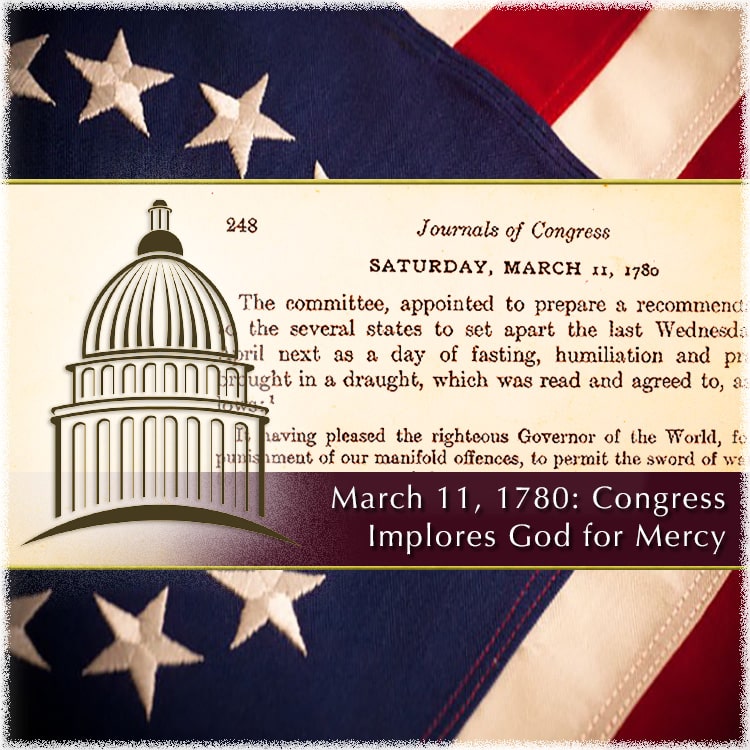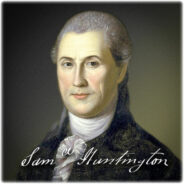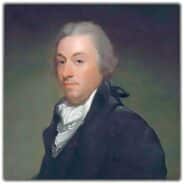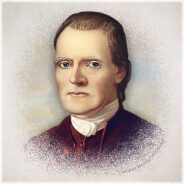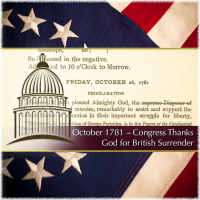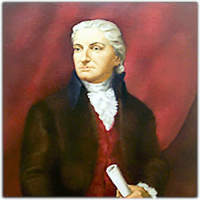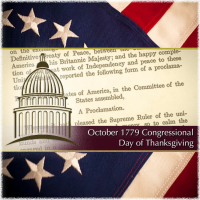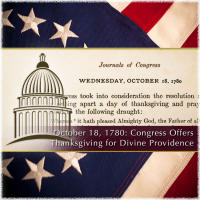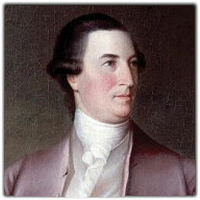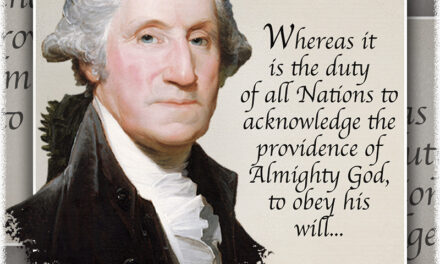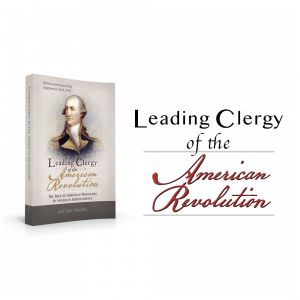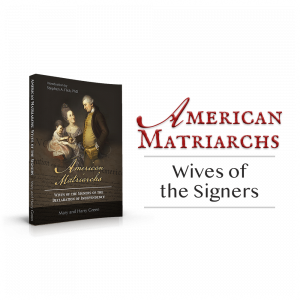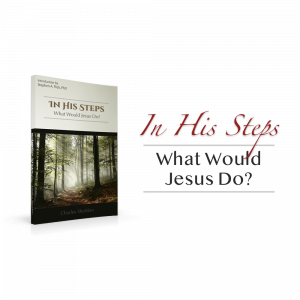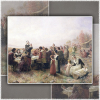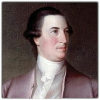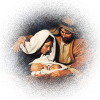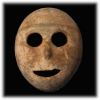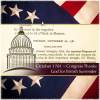During the American Revolution, Congress issued sixteen spiritual proclamations calling upon the Thirteen States to fast, pray, and give thanks to God. Congress usually designated a day when the proclamations were to be observed. So seriously did Congress take these Christian spiritual practices that it asked "that servile labour and recreations be forbidden on the said day."Sixth Congressional Fasting Proclamation
Soon after the Second Continental Congress convened in May 1775, it began to observe the Christian disciplines of fasting, praying, and giving thanks to God according to the pattern already established in a number of the states. In the spring, it was common for some states to ask their citizens to fast and pray, and in the fall, thanksgiving proclamations were issued. Following this pattern of the states, Congress also generally issued two Christian spiritual proclamations a year, observing fasting and prayer in the spring and thanksgiving in the fall. The spiritual proclamation issued by Congress on March 11, 1780 was the sixth "fasting, humiliation, and prayer" observance of the sixteen spiritual proclamations issued by Congress. A brief survey and summary of its development, along with the text of the proclamation, are provided in the lines that follow.Sixth Congressional Fasting Proclamation
The subject addressed in this article is discussed at greater length in When Congress Asked America to Fast, Pray, and Give Thanks to God. Christian Heritage Fellowship would be honored to work with individuals, businesses, churches, institutions, or organizations to help communicate the truth concerning the positive influence of the Christian faith by providing bulk pricing: Please contact us here... To purchase a limited quantity of this publication, please click: Purchase here...
Article Contents
No other president of Congress presided over as many spiritual proclamations as Samuel Huntington, signer of the Declaration of Independence. The March 1780 proclamation was the second of four to be issued during his tenure as president, which spanned from September 28, 1779 to July 9, 1781. Upon closer examination of his personal life, observers are not left to wonder about the role that the Christian faith wielded within his life.
As is revealed below in the excerpt from the Journals of Congress, five members were appointed to the committee to write the proclamation for prayer and fasting for March 1780. While each member is a legitimate subject for further discussion, the relationship that two of the committee members shared on July 4, 1776 is of particular interest.
The first two names listed—Robert R. Livingston and Roger Sherman—helped to form another important committee in Congress several years earlier. On June 11, 1776, Congress appointed five of its members to draft the Declaration of Independence. In addition to Roger Sherman and Robert Livingston, Congress also selected John Adams of Massachusetts, Benjamin Franklin of Pennsylvania, and Thomas Jefferson of Virginia. These five men came to be known as the "Committee of Five."
Robert R. Livingston of New York descended from a family involved in public and political life. He graduated from King's College, (later Columbia College of Columbia University) in 1765, studied law, and was admitted to the bar in 1770. For a period of time, he practiced law with John Jay. Following the ratification of a new state constitution, Livingston was selected as the first Chancellor of New York—then the highest judicial office of New York, a position he held from 1777 to 1801. For this distinction, he was dubbed, "The Chancellor." In his capacity as Chancellor, Livingston administered the oath of office to President George Washington upon his installation as the First President of the United States under the Constitution (April 30, 1789). Perhaps the most notable fact pertaining to Robert Livingston concerns the Louisiana Purchase. From 1801 to 1804, Livingston was the United States Minister to France; and in 1803, it was Livingston who negotiated the terms of the Louisiana Purchase, which added 828,000 square miles to the territory of the United States.[3]
Roger Sherman of Massachusetts received no formal education beyond that which he received in local schools. Coming under the classically trained Rev. Samuel Dunbar, however, Sherman acquired diligent habits of study, reading widely in theology, history, mathematics, and particularly in law and politics. A man of many talents and interests, he was admitted to the Litchfield bar and in May 1755 was sent as a representative to the General Assembly. Having contributed liberally to the Yale college chapel, he became the treasurer of Yale from 1765 to 1776. On two occasions, he served in the Continental Congress, from 1774 to1781 and 1783-84 and served as a delegate to the Constitution Convention in 1787. Arising out of humble circumstances, Roger Sherman became one of the most distinguished of America's Founding Fathers.[4]
An obvious fact must not be overlooked regarding the participation of these two men on this committee: The men who were charged with writing the Declaration of Independence believed that the spiritual proclamations of Congress to the states were completely consistent with their roles as political leaders. By their examples, they understood that Christianity does have a role in government.
Committee Composes Proclamation
The selection of the committee and the proclamation adopted by Congress have been extracted from two entries in the Journals of Congress and presented below. As is the case with other proclamations, some of the most significant subjects within the proclamation itself have been underline to evoke added attention on the part of the reader:
FRIDAY, MARCH 3, 1780
Resolved, That a committee of five be appointed to prepare and report a recommendation to the several states to set apart the last Wednesday in April next as a day of fasting, humiliation and prayer.
The members chosen, Mr. [Robert R.] Livingston, Mr. [Roger] Sherman, Mr. [Thomas] McKean, Mr. [William Churchill] Houston and Mr. [James] Lovell.[5]
A little more than a week after the committee was charged with drafting the proclamation, it was submitted to Congress as a whole and the final form was adopted:
SATURDAY, MARCH 11, 1780
The committee, appointed to prepare a recommendation to the several states to set apart the last Wednesday in April next as a day of fasting, humiliation and prayer, brought in a draught, which was read and agreed to, as follows:
It having pleased the righteous Governor of the World, for the punishment of our manifold offenses, to permit the sword of war still to harass our country, it becomes us to endeavor, by humbling ourselves before him, and turning from every evil way, to avert his anger and obtain his favor and blessing: it is therefore hereby recommended to the several states,
That Wednesday, the twenty sixth day of April next, be set apart and observed as a day of fasting, humiliation and prayer, that we may, with one heart and one voice, implore the sovereign Lord of Heaven and Earth to remember mercy in his judgments; to make us sincerely penitent for our transgressions; to prepare us for deliverance, and to remove the evils with which he hath been pleased to visit us; to banish vice and irreligion from among us, and establish virtue and piety by his divine grace; to bless all public councils throughout the United States, giving them wisdom, firmness and unanimity, and directing them to the best measures for the public good; to bless the magistrates and people of every rank, and animate and unite the hearts of all to promote the interests of their country; to bless the public defense, inspiring all commanders and soldiers with magnanimity and perseverance, and giving vigor and success to the military operations by sea and land; to bless the illustrious Sovereign and the nation in alliance with these states, and all who interest themselves in the support of our rights and liberties; to make that alliance of perpetual and extensive usefulness to those immediately concerned, and mankind in general; to grant fruitful seasons, and to bless our industry, trade and manufactures; to bless all schools and seminaries of learning, and every means of instruction and education; to cause wars to cease, and to establish peace among the nations.
And it is further recommended, that servile labour and recreations be forbidden on the said day.
Done in Congress andc.[6]
America's greatness is found in its Christian spiritual heritage. All individuals and nations assume the character of the God or gods they serve. Because secular or irreligious governments are built upon a godless worldview, they quickly become tyrannical. Since they explain the origin of the world through Charles Darwin's theory of evolution, they believe that might must always determine what is right—something which Darwin explained through his discussion of "tooth and talon." Irreligious secularism has been the cause of the deaths of millions of individuals in the twentieth century alone!
Islam has proven itself to be the bloodiest religions in world history. Why? Because it has assumed the character of its founder. Mohammad personally beheaded hundreds of individuals, attacking Jews, Christians, and fellow Arabs. Through his vicious attacks, Mohammad personally sowed the seeds of hate against those who would not bow to his religion, and in so doing, set in motion events that culminated in the Christian Crusades. Far from being peace loving, Islam has followed the example of its founder, terrorizing nations around the globe. All individuals and nations assume the character of the God or gods they serve.
Why has America been great? Because America's Founding Fathers sought to reflect the character of the God of the Bible. No nation in world history has more closely approximated the truth of the Bible as America, and the primary documents of America's origin demonstrate the Founding Fathers' desire to conform to the character of the God of Scripture. America's Founding Fathers were not irreligious, and their sixteen spiritual proclamations which were issued from June 1775 to August 1784 clearly demonstrate this fact! Only the most ill-informed continue to foist such unenlightened notions upon America and the world!
America deserves to know its true heritage.
Please contribute today!
[1] Mark A. Noll, "Ebenezer Devotion: Religion and Society in Revolutinary Connecticut," Church History: Studies in Christianity and Culture 45, no. 3 (September 1976), https://www.jstor.org/stable/3164264?seq=1#page_scan_tab_contents.
[2] Peter Marshall and David Manuel, The Light and the Glory (Grand Rapids, Michigan: Fleming H. Revell, 1977).
[3] Dictionary of American Biography, s.v. "Livingston, Robert R."
[4] Dictionary of American Biography, s.v. "Sherman, Roger."
[5] Journals of the Continental Congress, 1774-1789, 34 vols. (Washington, D.C.: Government Printing Office, 1904-1937), 16:225.
[6] Journals of the Continental Congress, 16:252-253. A note appended to this entry states this report was "in the writing of James Lovell."

